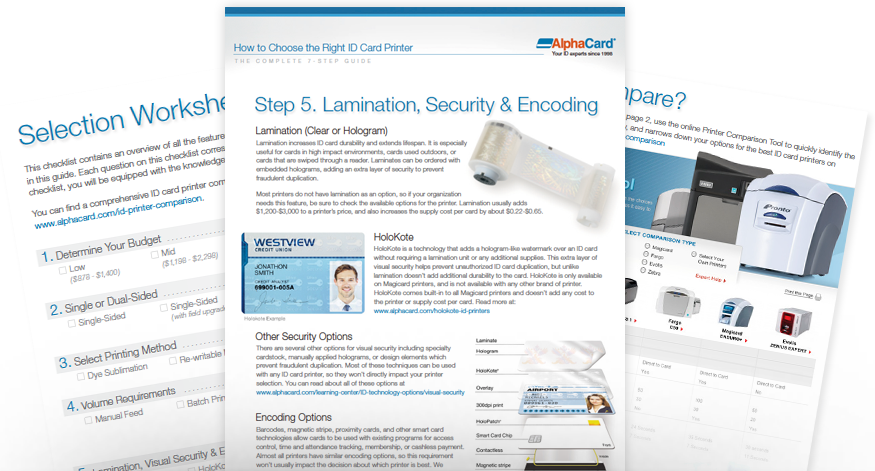Once your organization has administered an ID badge program, we recommend writing a comprehensive cardholder policy to ensure your system runs smoothly. The following list should be considered when fleshing out ID card policies:
ID Card Printing Procedures
Be sure to have clear, detailed answers to the following questions when creating an ID card printing policy:
- Who is responsible for making the ID cards?
- Where does the photo come from?
- Where does the card data come from?
- Are cards printed in batches or one at a time on demand?
- How are cards distributed?
- Who will be responsible for ordering supplies?
- Who will maintain the printer?
- How often should cards be reissued with updated data and an image?
Creating such a policy will help you determine how many blank ID cards and replacement ribbons to order. After all, it’s always a smart idea to have an extra supply of ID cards available. You can always order products in the future, but having a generous number of products at the outset is recommended.
ID Badge Display Policy
Some organizations have strict display policies when it comes to the visibility of an ID card. For example, if you’re running a school ID card program, it might be most effective for administrators and school teachers to display cards above their waist. Here are some key questions to ask:
- Are cardholders required to visibly display the badges at all times?
- How will these badges be worn or displayed?
- What happens if the card is forgotten at home?
- Will visitors be required to wear temporary badges?
- Do employees need a day badge?
While it may seem like a trivial policy to implement, a card’s placement on a body instantly hampers or increases visibility. Take this step seriously when developing your overall ID card policy.
Lost & Stolen Card Policy
Although cardholders are usually careful, eventually someone will lose an ID card or have a wallet stolen. By anticipating these situations and creating a procedure for replacing the card, you can make the transition between cards as quick and painless as possible. To prevent unauthorized individuals from gaining access into buildings, companies with access control card programs should deactivate the card the moment a cardholder reports a lost or stolen card, or is terminated.
Procedure for Issuing Replacement Cards
Make a list of what information or documents are required to get a new card printed—do employees need to remember their ID card numbers, take a new photo, or bring employment papers? Will you charge cardholders a fee for the replacement card, or print new cards at no cost? If you use encoded smart cards, can you deactivate the lost card to keep an unauthorized person from entering the office or gaining sensitive data stored on the card? How long will it take to create a replacement card, and does the cardholder need a temporary one in the meantime? Remember that knowing how you will handle lost or stolen cards before it happens will make it easier for cardholders to obtain new cards.
Procedure for Retiring Old Cards
Employee turnover is inevitable, so your ID card procedures should include a plan for deactivating, collecting, and destroying old ID cards. This same policy should cover cards that are reported lost or stolen, or cards that are being replaced due to an updated name or job title. Here are some questions to consider:
- When someone leaves the company, will the card be returned?
- Will the ID cards be deactivated?
- Will former employees be able to keep the cards?
- How will the cards be disposed of?
- Properly disposing of used ID cards or re-using them will impact the number of supplies you’ll need throughout the year. Fortunately, some ID cards are re-writable and can be printed onto a second time.
Communicating & Enforcing Policies
Many organizations include ID program policies as a section in the employee handbook section about workplace safety & security. It is also wise to include these policies on any internal communication forums or file sharing tools. You may want to send an annual policy reminder via email. The most difficult policy to enforce may be requiring employees to always wear ID badges. The most critical policy to enforce may be the timely reporting of lost or stolen cards.
Ask us for Help
Our specialty lies in creating long-term ID card programs and solutions for organizations, large and small. Whether you intend to deploy an access control ID system or are in search of volunteer badges, we have systems to suit every budget. Contact us now and let us evaluate your ID card needs – it’s an easy, no pressure call!





